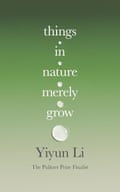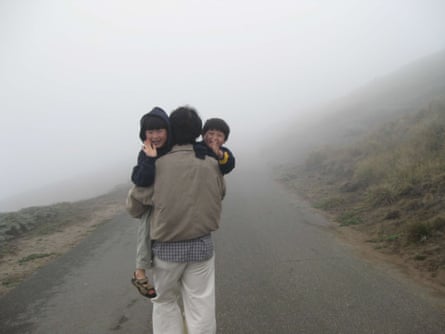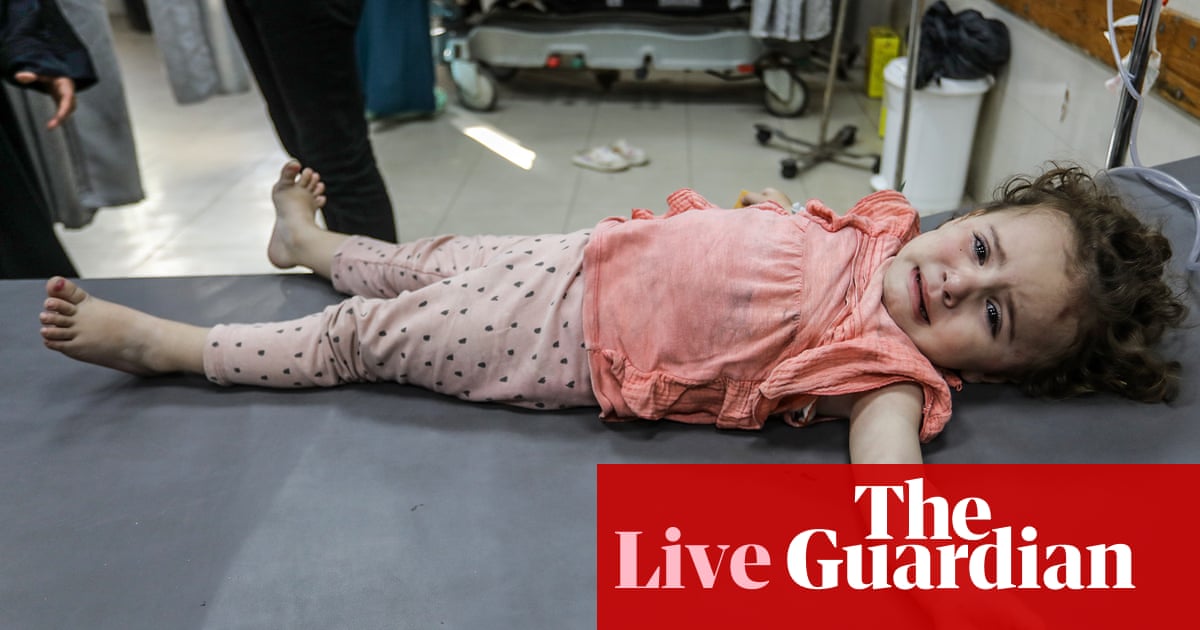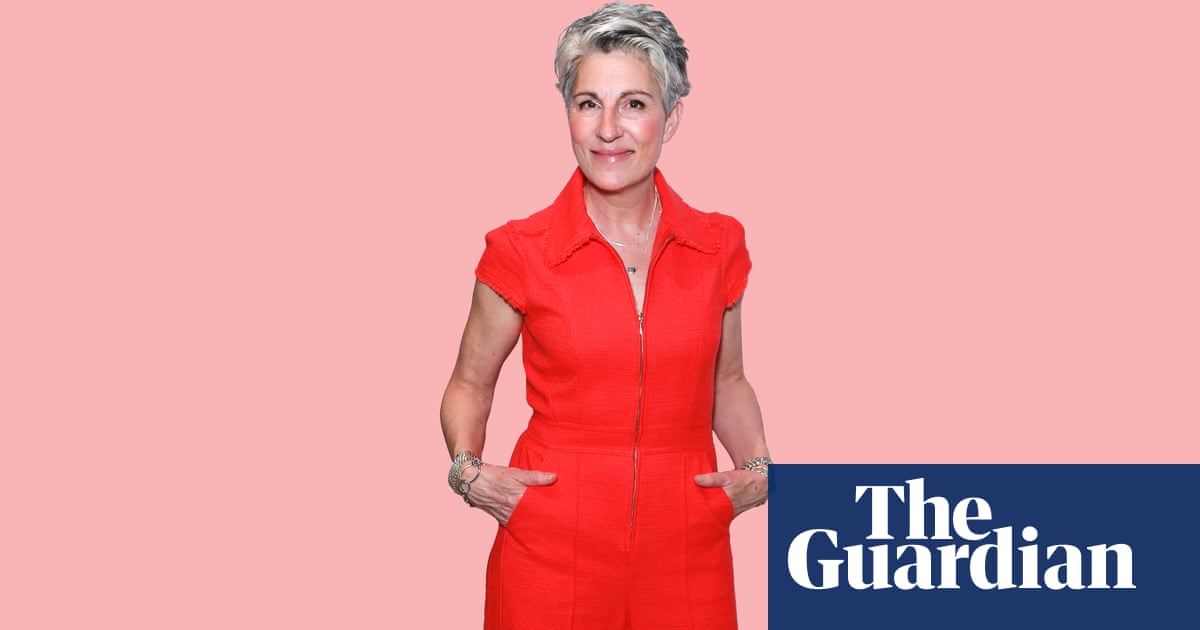As the novelist Yiyun Li often observes, there is no good way to state the facts of her life and yet they are inescapable: she had two sons, and both died by suicide. After her elder son Vincent died in 2017, at the age of 16, Li wrote a novel for him. Where Reasons End is a conversation, sometimes an argument, between a mother and her dead son, and it is a work of fiction that doesn’t feel fictional at all, because it’s also an encounter between a writer in mourning and the son she can still conjure up on the page. “With Vincent’s book there was that joy of meeting him again in the book, hearing him, seeing him, it was like he was alive,” she says. The book had 16 chapters, one for each year of his life, and Li felt she could have spent the rest of her life writing it, and also that she could not linger.
When her younger son James died in 2024, aged 19, Li wanted to write a book for him, too. James was harder to write for. Her sons were best friends but “such different boys”, she says. She and James did not argue in the same way as she did with Vincent, and he would hate to be thrust into the spotlight, or for her to write a “sentimental” book. James had a mind so brilliant that his inner workings were often unreachable – by seven or eight he’d open meal-time conversations with “apparently the Higgs boson …” or “apparently the predatory tunicates …”. He did not speak often, but could converse in eight languages and his phone was set to Lithuanian, a ninth. He once described Daniel Tammet’s Born on a Blue Day: Inside the Extraordinary Mind of an Autistic Savant as the only book that captured how he felt about the world. If Vincent lived “feelingly”, James lived “thinkingly”, Li says, and she wanted her book for him to be “as clear as James, as logical and rational”.

For months after his death, Li worried that she lacked the vocabulary to write about James, but then she began writing and realised “of course I could do this, this is what I do”. Things in Nature Merely Grow, her memoir of losing her sons, is resolutely unsentimental, and yet it might wind you with its emotional force. She wrote it in less than two months. Often people ask her if writing the book was cathartic. “No, never!” she replies. If it offered solace, “it was the solace of thinking”. “When I was writing the book it felt like I was at the centre of a hurricane. The eye of the hurricane is the stillest place. It’s very quiet and clear,” she says. And then she finished writing, and she stepped back into the hurricane. “My life goes on as a very strange woman,” she tells me, strange because her losses are so extreme: “Going out, people will always look at me and say, ‘Poor woman’.”
We meet at her home in Princeton, where photographs of her sons and paintings by Vincent decorate the walls, and every bookshelf is stacked two-deep. It is early spring, still cold, and the trees remain bare, but Li planted 1,600 bulbs in autumn and in the garden are bright clusters of daffodils, hyacinths and tulips. Gardening, which requires a constant revision of ambitions, is good practice for novel-writing and for life, Li observes, but these flowers are not a metaphor. She rejects the idea that grief is a process, that there’s light at the end of the tunnel. Even if she could “turn the page”, as the Chinese phrase goes, she would not want to. Li often looks up the etymology of words and notes that “grief” derives from burden. “My children were not my burden. My sadness is not my burden,” she says.

Li is the author of 12 books – among them novels, short-story collections, memoirs and literary criticism – and in 2010 she won a MacArthur genius grant. She is 52, slight, with cropped hair and a gentle manner. Soon after I arrive, she asks if I have children, which I do, and she says she realises this interview must be hard for me, too. She makes tea and puts out a plate of biscuits and checks several times that I am not cold or hungry. Later, she cooks lunch. At Princeton University, where she is a professor of creative writing, she says she tries to cultivate the right distance with her students, neither aloof nor maternal – and then sometimes she finds herself asking whether they’ve drunk enough water that day.
In her fiction classes, Li bans her students from writing about car crashes. In high emergencies people’s feelings are always the same, she tells them, and these extreme emotions are almost impossible to describe. She agrees with the poet Marianne Moore that “the deepest feeling always shows itself in silence; not in silence, but restraint”. Very occasionally in her writing, Li conveys a feeling directly, and then it is often startling, a highly contained explosion. “Sometimes I am so sad I feel like a freak,” the mother tells her son in Where Reasons End. But mostly we understand something of Li’s pain because she conveys it indirectly. “I am in an abyss,” she writes in Things in Nature Merely Grow. “If an abyss is where I shall be for the rest of my life, the abyss is my habitat.”
Another reason extreme pain is so hard to convey is because everyone’s abyss is different. She tells me that her husband is the only person who can ever understand hers. Li says she feels grateful if anyone finds comfort in her writing, but she knows some will not, and she does not want to become a figurehead for bereaved parents. “I realise we all have our own pain, and I cannot represent anyone,” she says. After Vincent’s death she received many messages from suicidal teenagers and parents who have outlived their children, and after James died, she received even more, this time from families who had lost twin boys, or multiple siblings, to suicide. She has recently removed her contact information from the internet. “I have given my words, that’s the only thing I can give,” she says; she is not a mental health professional, and she does not have the capacity to support strangers in severe distress.
After her sons died, she reread Shakespeare, Grief Lessons (Euripides’s plays translated by Anne Carson), CS Lewis’s A Grief Observed and Joan Didion’s accounts of losing her husband and daughter, The Year of Magical Thinking and Blue Nights. Li feels that Didion’s approach to writing about bereavement is closest to her own: both focus on their thoughts, rather than their feelings. When Didion describes how after her husband died a hospital social worker called her a “good customer”, because she remained calm, Li recognised herself. Both times the police arrived at her home with bad news, Li remained composed and noticed every detail. “Two things are good about me,” she tells me at one point. “I’m sturdy and I’m low maintenance.”
Li has always used reading as an “escape”. “Children of abusive parents might grow into rebels, or they might become escape artists,” she writes, and Li, who grew up in Beijing with an abusive mother, chose the latter. Her father was a nuclear physicist, and Li was a highly gifted mathematician. After completing a year’s compulsory military service, she studied science at Peking University before moving to the US at the age of 23 to study immunology at the University of Iowa. Her husband, Dapeng Li, a software engineer whom she met at university in China, did not join her until a year later. Feeling bored, Li took an evening adult education class in fiction. She loved it. When she wrote her first story, about a military training exercise, her instructor asked her if she’d ever thought of publishing. Inspired, she joined undergraduate creative writing classes and then applied to the prestigious Iowa Writers’ Workshop.
The first time she applied she was rejected, but the story she had submitted was published in the Paris Review. After she got into Iowa, on the second attempt, she started publishing stories in the New Yorker. For many years, she continued her PhD in immunology, studying asthma in mice, and because she also had small children, she wrote from midnight to 4am each night. In 2005, she published her debut short story collection, A Thousand Years of Good Prayers, to critical acclaim.
Li has always written in English, and she will not permit her books to be translated into Chinese. She describes this decision as so deeply personal that she resists any political interpretation. She and her husband speak to one another in Mandarin Chinese, but she now thinks and dreams in English and says she retains the advantage of not writing in her mother tongue. “I’m very careful with my words. Every time I put down a word, I think through it and make sure it’s the right word. But when you’re a native speaker you sometimes just use it automatically, right?” She says she has “a more precise personality” in English. Her writing, and her decision to do so in English, has made her a target in the Chinese media, and since her sons’ deaths she has been subject to vicious coverage.
In 2017, Li wrote a memoir, Dear Friend, from My Life I Write to You in Your Life, detailing how she was hospitalised twice with depression in 2012 after trying to kill herself. She believes her chronic sleep deprivation, as well as coming off psychiatric medication, played a role in her breakdown. In her new memoir, Li wonders how much her two suicide attempts, and her writing about them, affected her children. By trying to end her own life, did she also make them see suicide as a possibility to end their suffering? “I ask that question without any self-incrimination. I ask that question because it’s a very natural question,” she tells me. She is aware that people like to seek neat explanations for suicide and someone to blame, and usually they blame the parents. “I am very realistic in that I would always acknowledge that I am limited as their mother. I was limited, and I am still limited as a mother, so I can only do my best.”
She knows, however, that she parented them with thoughtfulness and care, and she fought to create space for them to live as they wanted and be fully themselves. She has been thinking a lot recently about how her son Vincent, who as a young teenager insisted on walking to school alone, a two-mile route through woodland, would often leave the house armed with pepper spray. The pepper spray would not protect him, she knew, but it gave him a sense of control and independence. “That pepper spray is about how we brought up our children, or how people bring up their children. You have to let them be, but the world is so bad, right? It’s not a safe place.” As hard as it is, she accepts her children’s decision to end their lives. “Respect and understanding are the two most important things I’ve given them,” she says. “This is a very sad fact of our lives, they took their own lives knowing we would accept and respect their decision.”
Since James’s death, Li has published two New Yorker short stories featuring a protagonist named Lilian, who has also lost two children to suicide. “I gave Lilian my life, but Lilian is not me,” she says. She has just completed a third Lilian story and there will probably be more. “I’m still learning how to live as me,” she says, and by writing her experiences into fiction she can think through her life, but at a distance. The Lilian stories are a side project. She has also just completed a big, more than 500-page novel, the first of a trilogy set around the turn of the 19th century. When she is writing fiction, she can feel fully immersed in her work. “It’s just you and your characters and you can spend a lot of time away with them, sort of away from the world,” she says. She feels like she discovers her characters, rather than makes them. “I believe God creates characters,” she says, and then she laughs at herself, “but I don’t believe in God.”
Sometimes Li thinks that writing fiction helped her prepare for her own tragedies. In her first novel, The Vagrants, published in 2009, she writes of an older couple, both beggars, who adopted seven girls, all of whom were later taken from them by the government. Li’s children were still young when she wrote the book, but when she reread it recently, she noticed how the elderly couple were always talking to one another about their lost children, in order to preserve their memories, just as she and her husband do now. “Even when I was younger, maybe I was rehearsing,” she says. “I think you have to be very clear-eyed to write fiction well, and that’s also probably a very good rehearsal for meeting my life.” Then she adds, sounding for a moment surprised, “It’s very strange, isn’t it?”
‘My children are timeless now’
A mother gives birth to a firstborn, and blunders through the baby’s infanthood. Then she gives birth to another baby. The second time things are somewhat familiar, less daunting, and yet just as many things can go wrong.
Losing a child for the second time, I knew some things to be important: sleep, hydration, small and frequent snacks, exercise every day. Get out of bed at the regular time and never ruminate while lying in bed. Make the effort to brew good coffee in the morning. Read – one act of Shakespeare is good enough, so is a page of Euclid’s geometry, a chapter of Henry James’s biography, or one poem – from Wallace Stevens’s collection. Write – there is no reason to stop working and there is also no reason to strive for regular working hours. Anything that prevents agitation or rumination is good for the mind. And, most important of all, for me: radical acceptance. The death of a child realigns time and space. If an abyss is where I shall be for the rest of my life, the abyss is my habitat. One should not waste energy fighting one’s habitat.
I have only this abyss, which is my life. And an inevitable part of existing in this abyss is exhaustion, which the second time I learned to accept without protest. After James died, flowers arrived in front of our door. The flowers deserved attention, but I had to turn myself inside out to find the energy needed for that attention. (Here’s a small thing I’ve learned: if one is to send flowers as a gesture of condolence, better to ensure the flowers arrive already arranged in a vase.)
In that exhaustion, still there is some living to do. What was within my capacity I would not shy away from, as work is as essential as breathing and sleeping.
I did not stop writing or take time off from teaching when Vincent died. Writing, teaching, gardening, grocery shopping, cooking, doing laundry – all these activities are time-bound, and they do not compete with my children, who are timeless now. There is no rush, as I will have every single day, for the rest of my life, to think about Vincent and James, outside time, outside the many activities of everyday life.
And this, among other reasons, is why I am against the word “grief,” which in contemporary culture seems to indicate a process that has an end point: the sooner you get there, the sooner you prove yourself to be a good sport at living, and the less awkward people around you will feel. Sometimes people ask me where I am in the grieving process, and I wonder whether they understand anything at all about losing someone. How lonely the dead would feel, if the living were to stand up from death’s shadow, clap their hands, dust their pants, and say to themselves and to the world, I am done with my grieving; from this point on it’s life as usual, business as usual.
I don’t want an end point to my sorrow. The death of a child is not a heatwave or a snowstorm, nor an obstacle race to rush through and win, nor an acute or chronic illness to recover from. What is grief but a word, a shortcut, a simplification of something much larger than that word? Thinking about my children is like air, like time. Thinking about them will only end when I reach the end of my life.
Things in Nature Merely Grow by Yiyun Li is published by 4th Estate on 22 May. To support the Guardian, order your copy at guardianbookshop.com. Delivery charges may apply.

 3 hours ago
5
3 hours ago
5

















































